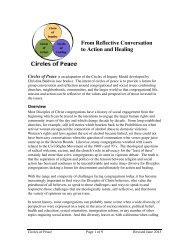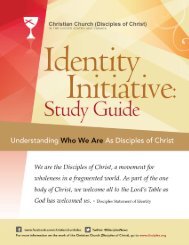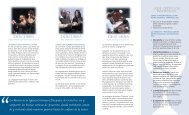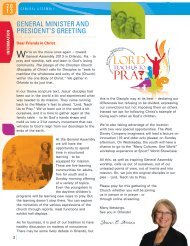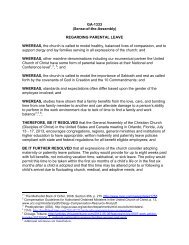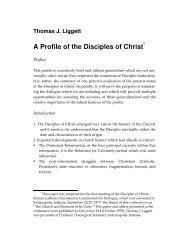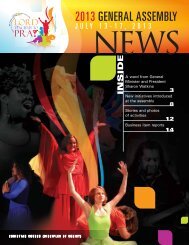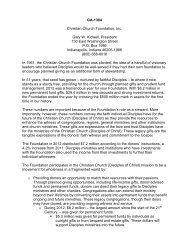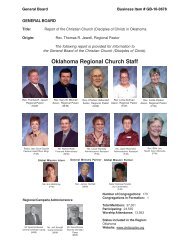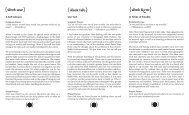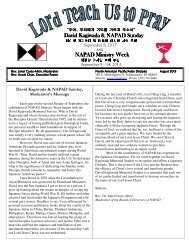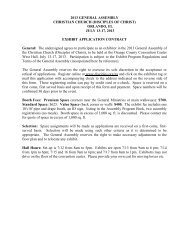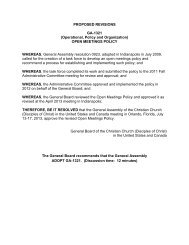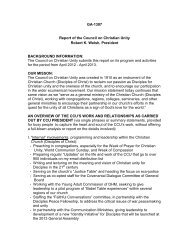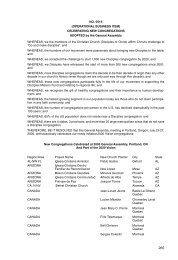RESOURCING THE CHURCH FOR ECUMENICAL MINISTRy A ...
RESOURCING THE CHURCH FOR ECUMENICAL MINISTRy A ...
RESOURCING THE CHURCH FOR ECUMENICAL MINISTRy A ...
You also want an ePaper? Increase the reach of your titles
YUMPU automatically turns print PDFs into web optimized ePapers that Google loves.
Christian Unity, Prophetic<br />
Witness, and the<br />
Unity of Humanity<br />
Kristine A. Culp<br />
Dr. Kristine a. Culp is the Dean of the Disciples Divinity<br />
House of the University of Chicago.<br />
Let me begin with words of gratitude to Joe and<br />
Nancy Stalcup, to Robert Welsh—and also to<br />
April Lewton. At Robert’s invitation, April gathered<br />
seven Disciples Divinity House students to discuss<br />
Christian unity and specifically, to reflect on “the<br />
challenge of maintaining unity and the church’s<br />
prophetic witness in the world” or, as the topic is<br />
phrased elsewhere, “understanding the connection<br />
between the unity of the church and the call for<br />
prophetic witness in our society and world.” That<br />
discussion provided the starting point for this<br />
paper. 1<br />
For several of my conversation partners, the first<br />
and overwhelming response was suspicion: Who was<br />
appealing to unity and why? When church statements<br />
appeal to unity, they asked, what conflicts are<br />
being suppressed? Perhaps the appearance of<br />
language about unity provides a sort of inverse index<br />
of dissent and division: an indication of suppressed<br />
positions? One interlocutor, who studies religion<br />
in colonial and postcolonial Africa, noted how<br />
integral assumptions of unity are to nation-states.<br />
How often is unity an attempt to consolidate the<br />
authority of churches by eliding diverse identities?<br />
These questions came from persons who are already<br />
cultivating intellectual, pastoral, and interpersonal<br />
arts of ecumenical, interreligious, and intercultural<br />
engagement. Let’s follow their impulse and agree<br />
that a “hermeneutics of suspicion,” to use Paul<br />
Ricoeur’s term, can be a good starting point. It is<br />
crucial to ask how the language of unity functions—<br />
what it allows us to imagine, to do, and to trust, and<br />
what it hides, suppresses, or denies.<br />
I’m going to follow some suspicions about appeals<br />
29<br />
to the unity of the church. Those suspicions arise in<br />
relation to basic human need and to transformation<br />
in history—the notions I am going to use here more<br />
than “prophetic witness” per se. (The language of<br />
prophetic witness can suggest a “stance” rather than<br />
concrete action to meet basic human needs and to<br />
enact political and economic changes that ensure<br />
those needs are met fairly for all.) Eventually, I will<br />
consider how Christian unity, especially as expressed<br />
in right participation and right testimony,<br />
serves the unity of humanity and witnesses to the<br />
grace and glory of the one God. Thus, I’m going to<br />
argue for distinguishing between the unity of the<br />
church and Christian unity, then I’m going to<br />
suggest that Christian unity must be interpreted<br />
and pursued in the context of the unity of humanity.<br />
For several of my conversation partners, the<br />
first and overwhelming response was suspicion:<br />
Who was appealing to unity and why?<br />
I’m going to do this in relation to key figures in the<br />
history of Christian thought: Augustine, who<br />
presented a more structural view of unity, but yet<br />
emphasized the transforming work of God in all of<br />
human history; Luther, who rejected a structural<br />
view of unity but possibly at the expense of transformation<br />
in history; and John Calvin, who stressed<br />
the importance of visible ministry and transformation—and<br />
whose thought informs the Disciples,<br />
at least indirectly. 2<br />
Arguably, the unity of the church was not a pressing<br />
practical matter for the earliest Christians; what<br />
pressed upon them were concerns about their<br />
susceptibility to persecution, false teaching, and<br />
alien powers, and about their status in the wider



